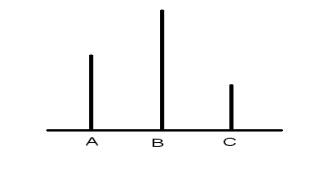
Conformity
Asch(1952) - Social Pressure and Conformity
Asch asked participants to answer a set of simple visual problems
On each problem participants had to ‘speak out’ which of the three
comparison lines matched a standard line in length.
Comparison Lines
Standard Lines


Several other people (usually 6-8) were also present during the
experiment
But unknown to the real participant, all were accomplices of the
experimenter.
On certain occasions known as critical trials the accomplicies offered answers that were clearly wrong
They unanimously(all together) chose the wrong line as a match for the
standard line.
Very importantly they said there answer before the participant did.
Therefore on these critical trials, the participants faced a
dilemma(problem)
Should they go along with the other people present ?
or
Should they stick to their own judgements?
The results of this
experiment showed that
1) 76% of those tested went along with the group's false answers at least
once,
2) in fact , they voiced their agreement with these errors about 37% of
the time.
3) 12 out of 50 participants never conformed. Some of these 'independent'
participants were confident in their judgements.However, they experienced
tension and doubt but managed to resist the pressure of the group
TIER H
Factors Affecting Conformity
Group Togetherness
Asch investigated the effects of shattering the groups togetherness (by
having one of the accomplices break with the others).
He did this by
A person giving the correct answer becoming an 'ally' of the real
participant.
Results indicated that conformity was reduced
Asch investigated the size of the group and conformity.
He discovered if the group only consisted of 2 people
conformity level dropped Asch found that conformity increases with group
size upto about 6/7 members but any more conformity will start to decrease.
Asch investigated the type of the task and conformity, he discovered if
the task details were left unclear or if the task was made more difficult, that
this would increase conformity.
In conclusion - It seems to be the togetherness of the group that is
crucial to conformity: it is much easier to resist group pressure when such
togetherness is lacking.
click HERE to return to homepage